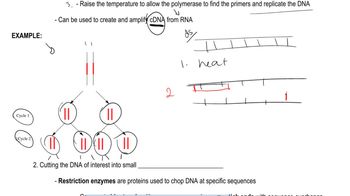- 1. Introduction to Genetics51m
- 2. Mendel's Laws of Inheritance3h 37m
- 3. Extensions to Mendelian Inheritance2h 41m
- 4. Genetic Mapping and Linkage2h 28m
- 5. Genetics of Bacteria and Viruses1h 21m
- 6. Chromosomal Variation1h 48m
- 7. DNA and Chromosome Structure56m
- 8. DNA Replication1h 10m
- 9. Mitosis and Meiosis1h 34m
- 10. Transcription1h 0m
- 11. Translation58m
- 12. Gene Regulation in Prokaryotes1h 19m
- 13. Gene Regulation in Eukaryotes44m
- 14. Genetic Control of Development44m
- 15. Genomes and Genomics1h 50m
- 16. Transposable Elements47m
- 17. Mutation, Repair, and Recombination1h 6m
- 18. Molecular Genetic Tools19m
- 19. Cancer Genetics29m
- 20. Quantitative Genetics1h 26m
- 21. Population Genetics50m
- 22. Evolutionary Genetics29m
18. Molecular Genetic Tools
Genetic Cloning
Problem 19e
Textbook Question
In a typical PCR reaction, describe what is happening in stages occurring at temperature ranges (a) 92-26 °C, (b) 45-65 °C, and (c) 65-75 °C.
 Verified step by step guidance
Verified step by step guidance1
Identify the three main stages of a PCR reaction: denaturation, annealing, and extension.
For the temperature range 92-96 °C, describe the denaturation stage where the double-stranded DNA is heated to separate it into two single strands.
For the temperature range 45-65 °C, explain the annealing stage where primers bind to the single-stranded DNA template at specific complementary sequences.
For the temperature range 65-75 °C, discuss the extension stage where the DNA polymerase synthesizes a new DNA strand by adding nucleotides to the annealed primer.
Summarize how these stages are repeated for multiple cycles to exponentially amplify the target DNA sequence.
Recommended similar problem, with video answer:
 Verified Solution
Verified SolutionThis video solution was recommended by our tutors as helpful for the problem above
Video duration:
1mPlay a video:
Was this helpful?
Key Concepts
Here are the essential concepts you must grasp in order to answer the question correctly.
Polymerase Chain Reaction (PCR)
PCR is a molecular biology technique used to amplify specific DNA sequences. It involves repeated cycles of denaturation, annealing, and extension, allowing for the exponential increase of the target DNA. Understanding PCR is essential for grasping how temperature changes affect the reaction stages.
Recommended video:
Guided course

Genetic Cloning
Denaturation
Denaturation is the first step in PCR, occurring at high temperatures (around 92-96 °C). During this stage, the double-stranded DNA melts open to form two single strands, breaking the hydrogen bonds between the base pairs. This step is crucial for making the DNA accessible for the subsequent annealing process.
Annealing and Extension
Annealing occurs at lower temperatures (45-65 °C), where primers bind to the single-stranded DNA templates. This is followed by the extension phase (65-75 °C), where DNA polymerase synthesizes new DNA strands by adding nucleotides to the primers. These stages are vital for the specificity and efficiency of DNA amplification in PCR.
Recommended video:
Guided course

Genetic Cloning

 7:43m
7:43mWatch next
Master Genetic Cloning with a bite sized video explanation from Kylia Goodner
Start learningRelated Videos
Related Practice

